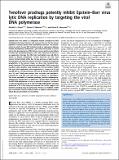| dc.contributor.author | Drosu, Natalia C | |
| dc.contributor.author | Edelman, Elazer R | |
| dc.contributor.author | Housman, David E | |
| dc.date.accessioned | 2021-10-27T20:23:01Z | |
| dc.date.available | 2021-10-27T20:23:01Z | |
| dc.date.issued | 2020 | |
| dc.identifier.uri | https://hdl.handle.net/1721.1/135335 | |
| dc.description.abstract | © 2020 National Academy of Sciences. All rights reserved. Epstein-Barr virus (EBV) is a ubiquitous human γ-herpesvirus that establishes life-long infection and increases the risk for the development of several cancers and autoimmune diseases. The mechanisms by which chronic EBV infection leads to subsequent disease remain incompletely understood. Lytic reactivation plays a central role in the development of EBV-driven cancers and may contribute to other EBV-associated diseases. Thus, the clinical use of antivirals as suppressive therapy for EBV lytic reactivation may aid efforts aimed at disease prevention. Current antivirals for EBV have shown limited clinical utility due to low potency or high toxicity, leaving open the need for potent antivirals suitable for long-term prophylaxis. In the present study, we show that tenofovir disoproxil fumarate (TDF) and tenofovir alafenamide (TAF), drugs with excellent safety profiles used clinically for HIV prevention, inhibit EBV lytic DNA replication, with respective IC50 values of 0.30 μM and 84 nM. In a cell-based assay, TAF was 35- and 24-fold and TDF was 10- and 7-fold more potent than acyclovir and penciclovir, respectively, and TAF was also twice as potent as ganciclovir. The active metabolite of tenofovir prodrugs, tenofovir-diphosphate, inhibited the incorporation of dATP into a primed DNA template by the EBV DNA polymerase in vitro. In contrast to acyclovir, treatment of cells during latency for 24 h with TAF still inhibited EBV lytic DNA replication at 72 h after drug was removed. Our results suggest that tenofovir prodrugs may be particularly effective as inhibitors of EBV lytic reactivation, and that clinical studies to address critical questions about disease prevention are warranted. | |
| dc.language.iso | en | |
| dc.publisher | Proceedings of the National Academy of Sciences | |
| dc.relation.isversionof | 10.1073/PNAS.2002392117 | |
| dc.rights | Article is made available in accordance with the publisher's policy and may be subject to US copyright law. Please refer to the publisher's site for terms of use. | |
| dc.source | PNAS | |
| dc.title | Tenofovir prodrugs potently inhibit Epstein–Barr virus lytic DNA replication by targeting the viral DNA polymerase | |
| dc.type | Article | |
| dc.contributor.department | Massachusetts Institute of Technology. Institute for Medical Engineering & Science | |
| dc.contributor.department | Massachusetts Institute of Technology. Department of Biology | |
| dc.relation.journal | Proceedings of the National Academy of Sciences of the United States of America | |
| dc.eprint.version | Final published version | |
| dc.type.uri | http://purl.org/eprint/type/JournalArticle | |
| eprint.status | http://purl.org/eprint/status/PeerReviewed | |
| dc.date.updated | 2021-03-19T13:20:06Z | |
| dspace.orderedauthors | Drosu, NC; Edelman, ER; Housman, DE | |
| dspace.date.submission | 2021-03-19T13:20:07Z | |
| mit.journal.volume | 117 | |
| mit.journal.issue | 22 | |
| mit.license | PUBLISHER_CC | |
| mit.metadata.status | Authority Work and Publication Information Needed | |
